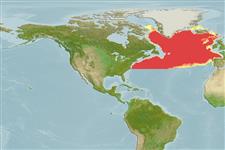Environment: milieu / climate zone / depth range / distribution range
Ökologie
seewasser bathypelagisch; tiefenbereich 216 - 3237 m (Ref. 58018). Deep-water; 70°N - 35°N, 75°W - 2°W
Eastern Atlantic: Iceland, Faeroes and Shetlands to Portugal. Probably antitropical and present in other oceans. Northwest Atlantic: Canada (Ref. 5951).
Size / Gewicht / Alter
Maturity: Lm ? range ? - ? cm
Max length : 20.0 cm TL Männchen/unbestimmt; (Ref. 123983)
Rückenflossenweichstrahlen (insgesamt) : 9 - 11; Afterflossenweichstrahlen: 16 - 19. Body robust and compressed. Small gill opening. Anal fin base longer than the length of the caudal peduncle. Dark pigment on the scale pockets (Ref. 37473).
Bathypelagic (Ref. 58426). Sometimes caught in large aggregations. Eggs and larvae are pelagic (Ref. 6345). Feeds on small crustaceans (Ref. 5951). Minimum depth reported taken from Ref. 117245.
Life cycle and mating behavior
Geschlechtsreife | Fortpflanzung | Ablaichen | Eier | Fecundity | Larven
Cohen, D.M., 1984. Bathylagidae. p. 392-394. In P.J.P. Whitehead, M.-L. Bauchot, J.-C. Hureau, J. Nielsen and E. Tortonese (eds.) Fishes of the north-eastern Atlantic and the Mediterranean, Volume 1. Unesco, Paris. (Ref. 6345)
IUCN Rote Liste Status (Ref. 130435: Version 2024-2)
Bedrohung für Menschen
Harmless
Nutzung durch Menschen
Tools
Zusatzinformationen
Download XML
Internet Quellen
Estimates based on models
Preferred temperature (Ref.
123201): 3.3 - 5.8, mean 3.9 °C (based on 372 cells).
Phylogenetic diversity index (Ref.
82804): PD
50 = 0.5078 [Uniqueness, from 0.5 = low to 2.0 = high].
Bayesian length-weight: a=0.00525 (0.00219 - 0.01260), b=3.01 (2.80 - 3.22), in cm total length, based on LWR estimates for this (Sub)family-body shape (Ref.
93245).
Trophic level (Ref.
69278): 3.3 ±0.38 se; based on food items.
Widerstandsfähigkeit (Ref.
120179): mittel, Verdopplung der Population dauert 1,4 - 4,4 Jahre. (Preliminary K or Fecundity.).
Fishing Vulnerability (Ref.
59153): Low vulnerability (10 of 100).
